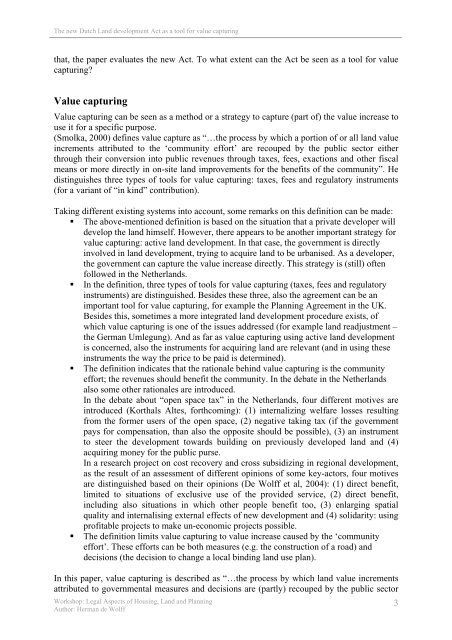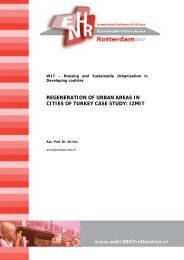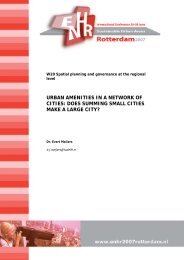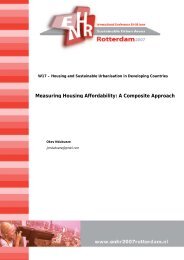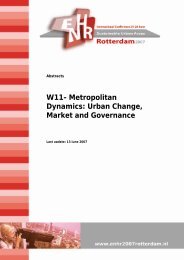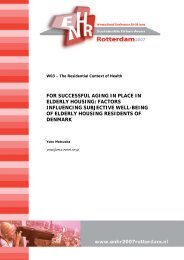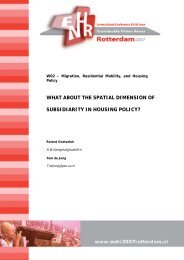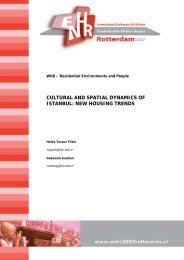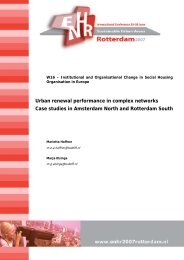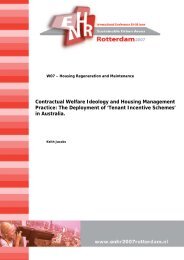The new Dutch Land development Act as a tool for value capturing
The new Dutch Land development Act as a tool for value capturing
The new Dutch Land development Act as a tool for value capturing
Create successful ePaper yourself
Turn your PDF publications into a flip-book with our unique Google optimized e-Paper software.
<strong>The</strong> <strong>new</strong> <strong>Dutch</strong> <strong>Land</strong> <strong>development</strong> <strong>Act</strong> <strong>as</strong> a <strong>tool</strong> <strong>for</strong> <strong>value</strong> <strong>capturing</strong><br />
that, the paper evaluates the <strong>new</strong> <strong>Act</strong>. To what extent can the <strong>Act</strong> be seen <strong>as</strong> a <strong>tool</strong> <strong>for</strong> <strong>value</strong><br />
<strong>capturing</strong>?<br />
Value <strong>capturing</strong><br />
Value <strong>capturing</strong> can be seen <strong>as</strong> a method or a strategy to capture (part of) the <strong>value</strong> incre<strong>as</strong>e to<br />
use it <strong>for</strong> a specific purpose.<br />
(Smolka, 2000) defines <strong>value</strong> capture <strong>as</strong> “…the process by which a portion of or all land <strong>value</strong><br />
increments attributed to the ‘community ef<strong>for</strong>t’ are recouped by the public sector either<br />
through their conversion into public revenues through taxes, fees, exactions and other fiscal<br />
means or more directly in on-site land improvements <strong>for</strong> the benefits of the community”. He<br />
distinguishes three types of <strong>tool</strong>s <strong>for</strong> <strong>value</strong> <strong>capturing</strong>: taxes, fees and regulatory instruments<br />
(<strong>for</strong> a variant of “in kind” contribution).<br />
Taking different existing systems into account, some remarks on this definition can be made:<br />
• <strong>The</strong> above-mentioned definition is b<strong>as</strong>ed on the situation that a private developer will<br />
develop the land himself. However, there appears to be another important strategy <strong>for</strong><br />
<strong>value</strong> <strong>capturing</strong>: active land <strong>development</strong>. In that c<strong>as</strong>e, the government is directly<br />
involved in land <strong>development</strong>, trying to acquire land to be urbanised. As a developer,<br />
the government can capture the <strong>value</strong> incre<strong>as</strong>e directly. This strategy is (still) often<br />
followed in the Netherlands.<br />
• In the definition, three types of <strong>tool</strong>s <strong>for</strong> <strong>value</strong> <strong>capturing</strong> (taxes, fees and regulatory<br />
instruments) are distinguished. Besides these three, also the agreement can be an<br />
important <strong>tool</strong> <strong>for</strong> <strong>value</strong> <strong>capturing</strong>, <strong>for</strong> example the Planning Agreement in the UK.<br />
Besides this, sometimes a more integrated land <strong>development</strong> procedure exists, of<br />
which <strong>value</strong> <strong>capturing</strong> is one of the issues addressed (<strong>for</strong> example land readjustment –<br />
the German Umlegung). And <strong>as</strong> far <strong>as</strong> <strong>value</strong> <strong>capturing</strong> using active land <strong>development</strong><br />
is concerned, also the instruments <strong>for</strong> acquiring land are relevant (and in using these<br />
instruments the way the price to be paid is determined).<br />
• <strong>The</strong> definition indicates that the rationale behind <strong>value</strong> <strong>capturing</strong> is the community<br />
ef<strong>for</strong>t; the revenues should benefit the community. In the debate in the Netherlands<br />
also some other rationales are introduced.<br />
In the debate about “open space tax” in the Netherlands, four different motives are<br />
introduced (Korthals Altes, <strong>for</strong>thcoming): (1) internalizing welfare losses resulting<br />
from the <strong>for</strong>mer users of the open space, (2) negative taking tax (if the government<br />
pays <strong>for</strong> compensation, than also the opposite should be possible), (3) an instrument<br />
to steer the <strong>development</strong> towards building on previously developed land and (4)<br />
acquiring money <strong>for</strong> the public purse.<br />
In a research project on cost recovery and cross subsidizing in regional <strong>development</strong>,<br />
<strong>as</strong> the result of an <strong>as</strong>sessment of different opinions of some key-actors, four motives<br />
are distinguished b<strong>as</strong>ed on their opinions (De Wolff et al, 2004): (1) direct benefit,<br />
limited to situations of exclusive use of the provided service, (2) direct benefit,<br />
including also situations in which other people benefit too, (3) enlarging spatial<br />
quality and internalising external effects of <strong>new</strong> <strong>development</strong> and (4) solidarity: using<br />
profitable projects to make un-economic projects possible.<br />
• <strong>The</strong> definition limits <strong>value</strong> <strong>capturing</strong> to <strong>value</strong> incre<strong>as</strong>e caused by the ‘community<br />
ef<strong>for</strong>t’. <strong>The</strong>se ef<strong>for</strong>ts can be both me<strong>as</strong>ures (e.g. the construction of a road) and<br />
decisions (the decision to change a local binding land use plan).<br />
In this paper, <strong>value</strong> <strong>capturing</strong> is described <strong>as</strong> “…the process by which land <strong>value</strong> increments<br />
attributed to governmental me<strong>as</strong>ures and decisions are (partly) recouped by the public sector<br />
Workshop: Legal Aspects of Housing, <strong>Land</strong> and Planning<br />
Author: Herman de Wolff<br />
3


